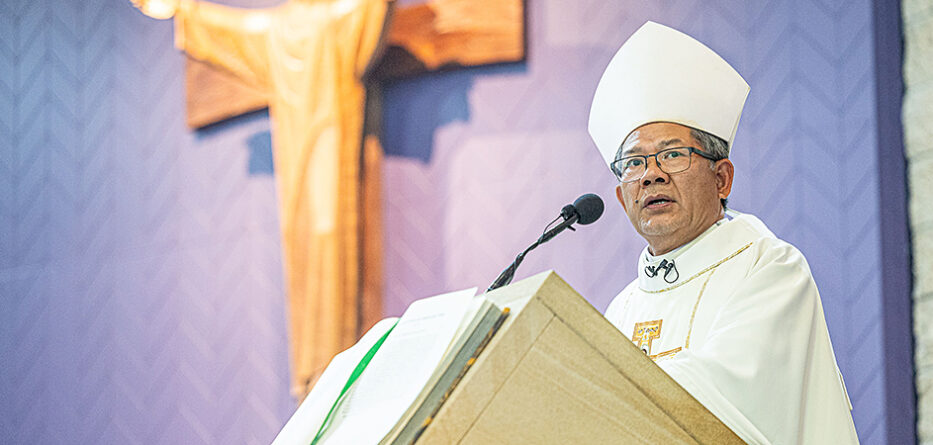Most Reverend Vincent Long Van Nguyen OFM Conv DD STL, Bishop of Parramatta
Homily for the Sixth Sunday of Ordinary Time, Year B, and the 2024 Diocesan celebration of the Feast Day of St Josephine Bakhita at St Patrick’s Church, Mary, Queen of the Family Parish, Blacktown
Readings: Leviticus 13:1-2, 44-46; Psalm 31(32):1-2, 5, 11; 1 Corinthians 10:31 – 11:1; Mark 1:40-45
11 February 2024
Honouring St Josephine Bakhita by meeting God in the marginalised
Dear friends,
It is with great joy that we have gathered today to celebrate the feast of St Josephine Bakhita who is the pride of the South Sudanese people and in the words of Pope St John Paul II, “a shining advocate for genuine emancipation”. She is a proof that God can use the most unlikely people to do extraordinary things. Her legacy that transformation is possible through suffering is written into the history of the nation and the resilience of the people of South Sudan.
God does work in mysterious ways. He brings about new life from apparent defeat, dispersion and loss. This was true of the chosen people, the early Church as well as the Church of today. When we survey salvation history, we recognise that out of the crisis of the exile, the battered people or the anawim of God became the nucleus of the new Israel. Similarly, out of the persecution of the early Christians by the hostile forces in Palestine, the universal Church was born. Even in our own days, the Catholic congregations in Australia are bolstered by those who came here as stricken migrants and refugees.
Scriptures this Sunday also inspire us to be the wounded healers after the example of Jesus. He was not afraid to stand with the marginalised and to call out exclusionary attitudes and practices.
The Gospel tells us the story of Jesus’ encounter with the leper, which is situated among other healing stories. He has healed the demoniac in the synagogue, Peter’s mother-in-law in her house and many other sick people throughout all Galilee. He has presented Himself as a healer, a champion of the masses and a preacher with authority. The poor are the milieu in which Jesus enacts His kingdom vision. In His words and actions, they feel the power of the God of the Covenant.
The leper story, however, moves Jesus’ intents and purposes to another level. It shows that more than concerned with the individual’s wellbeing, He is not afraid to confront the discriminatory and exclusionary practices based on ignorance and prejudice. This ignorance and prejudice is codified in the book of Leviticus.
Accordingly, leprosy is the ultimate curse. It renders the person unclean physically as well as spiritually. The leper is condemned to a life of shame and harsh social isolation. The first reading gives us a brief but revealing description of how lepers are treated or mistreated in Israel. Simply put, they are condemned to a brutal inhumane existence.
By reaching out and touching the leper, Jesus breaks ranks with His contemporaries. When the leper approaches him, Jesus responds with a respect that simultaneously acknowledges the man’s dignity and critiqued society’s exclusivism. Jesus does not just heal the man, but He shows how an alternative social system operates. He turns the table on the competition that favours the socially upward mobile. Jesus’ touch is a declaration that the rejected are God’s companions and favourites.
After being cured of leprosy, the man was told to go to the priest so that he could be readmitted into the community. Even though He had performed the healing outside the temple system, Jesus did not stop at the personal level. As He did to the woman who had touched him and found herself healed of her haemorrhage, Jesus was interested in confronting injustices towards the vulnerable. By commanding the man to go to the temple, He challenges the community to examine its attitudes and practices in respect of the marginalised and the outcast. The healing of the leper moves from the healing of a sick individual to the healing of a sick society.
Brothers and sisters,
The message of the Gospel is that we cannot be disciples of Jesus and fail to address injustices against God’s poor and vulnerable. The care of the marginalised is central to our identity and mission. Pope Francis constantly reminds us of the challenge to question the status quo, to renounce security and mediocrity, to cross the street like the Samaritan, to meet God in the wounded and marginalised.
Let us learn from Christ who immersed himself totally in the coalface realities of pain, suffering, isolation and condemnation that many experience. It is that precarious existence where the true cost of our discipleship is counted, because we dare to walk with the Samaritans of our time. Ultimately, we are challenged to prod at our own sense of security and to stretch our capacity to love. For that is where the God of solidarity calls us to be. May we learn to walk with the God of love, inclusion and compassion, as we endeavour not to earn as much as to make His kingdom a reality in the world. May the example of St Josephine Bakhita inspire us to be the servants of the Kingdom, acting as its leaven in our time and environment.








